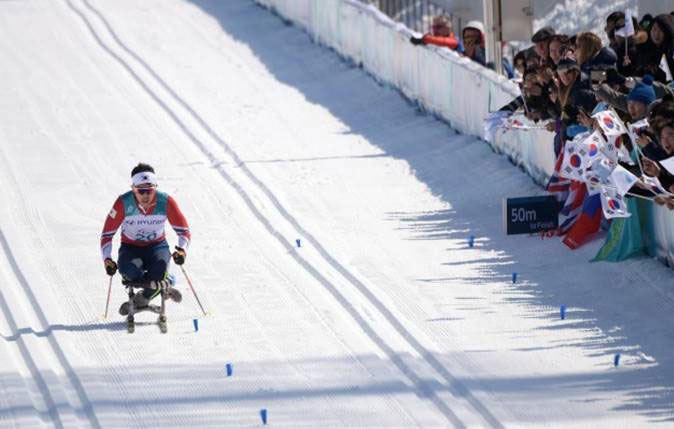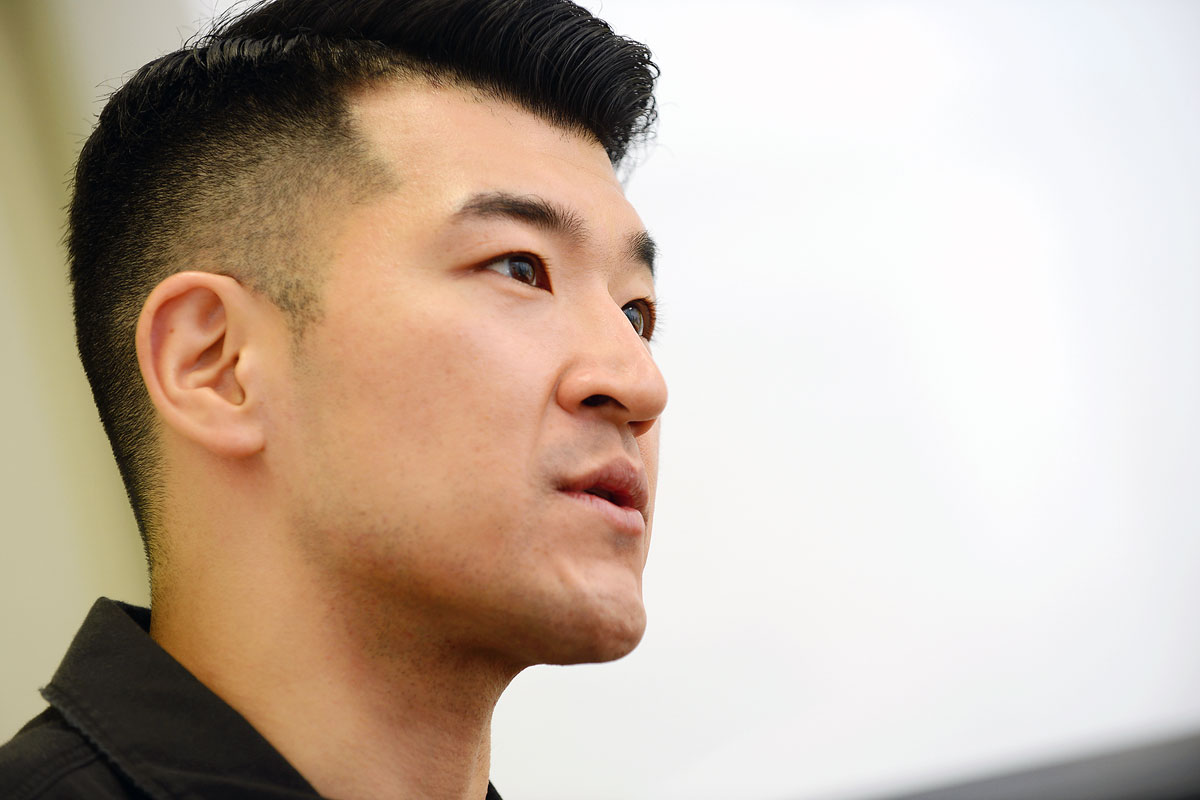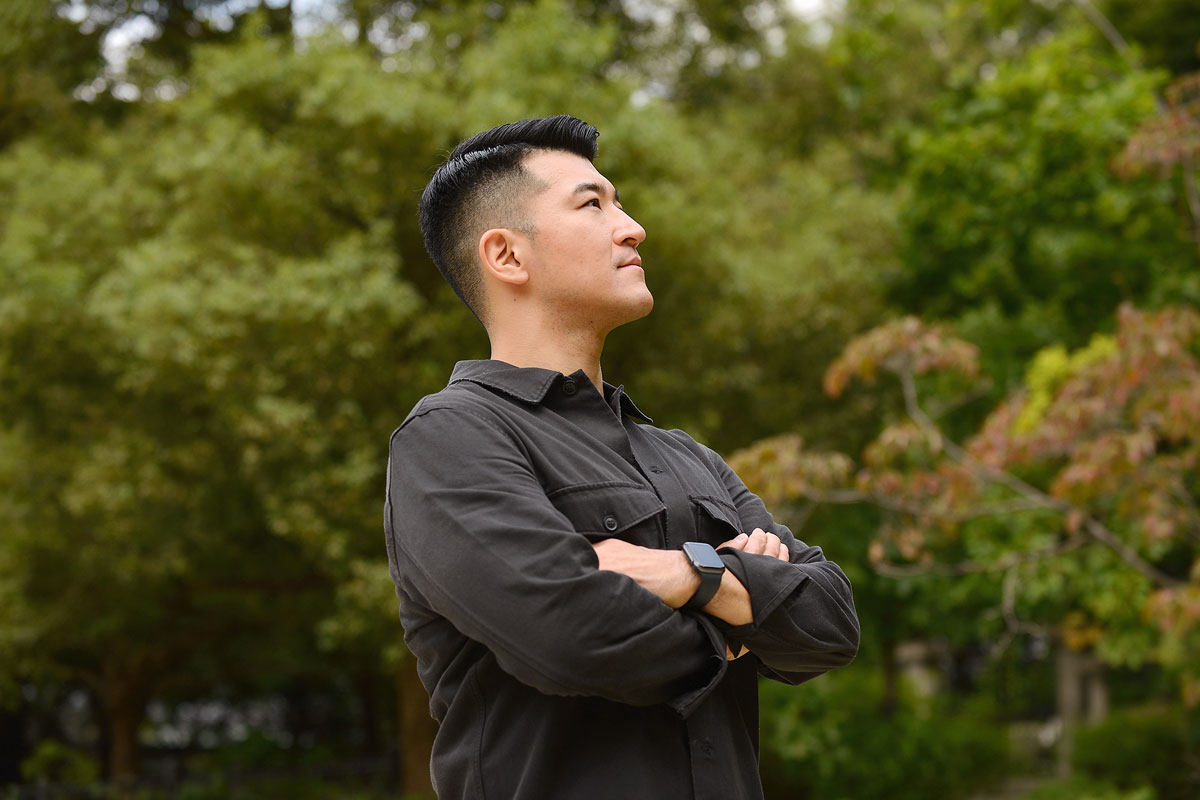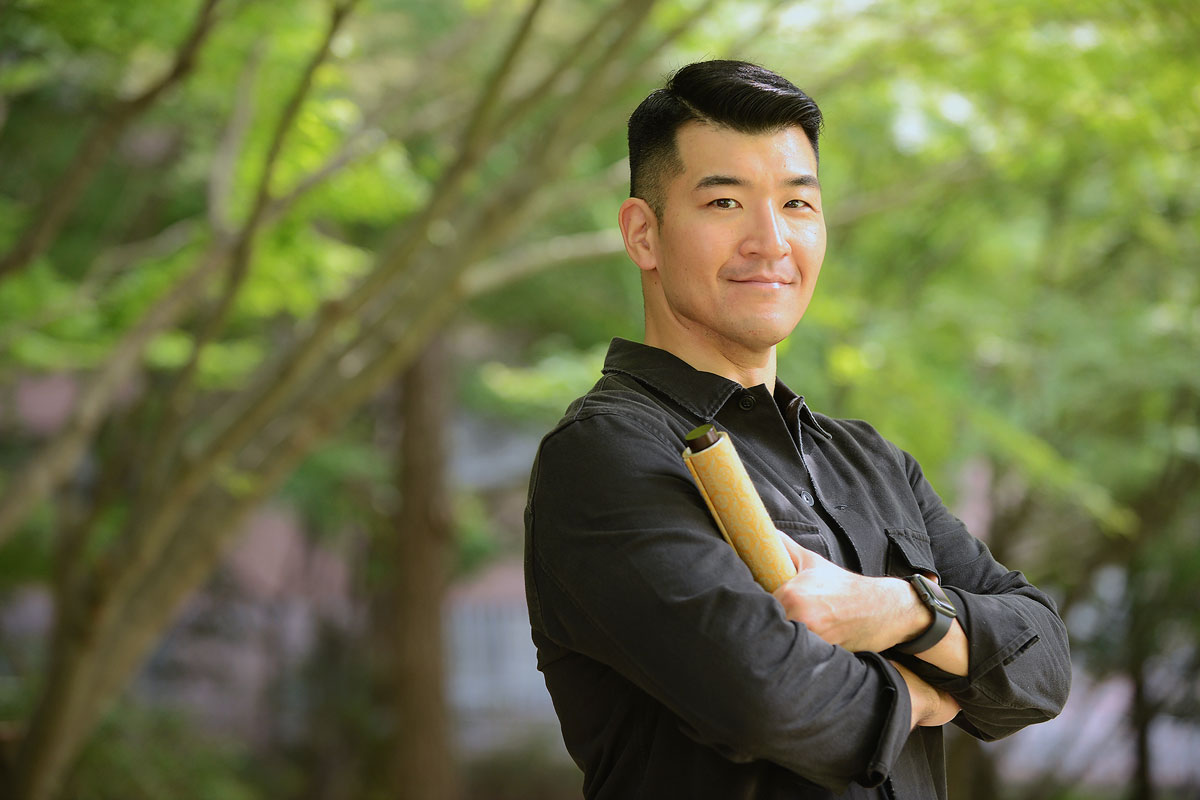

© Yuki Saito

Sport gives me confidence in myself as I am. Through sport, I realised that I have a unique characteristic like no one else, which I should make the most of. People of the world are all different; with different races, religions and, if it is a person with disabilities, different disabilities – sport makes me proud of what I have and who I am.
When I was ten years old, I developed paralysis in the lower part of my body, and I could not move at all for two years. It gave me low self-esteem and lack of confidence. It was very hard to adjust my emotions. But because I started sport, it got a little balanced, and I started to learn how to manage myself, so that was kind of like finding my own tools and methods to be more sustainable with the disability. In the past, I was afraid that my difference would not be accepted by other people, and I felt isolated. Today, I feel confidence in the fact that I possess a uniqueness that differs from other people. I cannot be doing things other people can do. I have to separate it, but I do not feel lonely for that because I have my own different and unique condition and characteristic, so I have to maintain with my own characteristics. But now, I know precisely what I can do or cannot do in daily life. Getting to know your own body and exercising boost your immune system. It allows you to work, study, or interact with people with confidence. Sport is something indispensable for me. It is a part of my life and is like a pill for self-management.
I learnt many things through sport. It taught me to always be positive, well-disciplined and know my own limitations. It also taught me that you have to be more humble; you have to be more respectful. By entering in international Para sport competitions and meeting various para athletes, I realised that I had an ego. I thought I was ‘better’ than other people with disabilities. I was kind of looking down on them because I thought, I am educated in America and I speak very good English. Maybe I have better physical function compared to other people. However, in truth, there were so many things that I could not do as compared to other para athletes with more severe impairments than me. By meeting many other para athletes, becoming friends and hearing about their lives and disabilities, I realised that we all were trying to maximize our ‘abilities’. Each one of us was thinking about ourselves, searching for how to go about our relationship with society and other people, and expressing that feeling through sport. I discovered that I had an ego by obtaining a different opportunity through sport. Sport made me very humble. I learnt to respect other people. It made me think of how “the bough that bears the most fruit hangs lowest”.


© Jeong Min Lee
I spent about ten years of my life in the United States. I was there since I was 15 years old. When I came back to Korea, I was really shocked to find myself seen only as ‘a person with a disability’. That was how I started becoming involved in sport in earnest.
My parents sent me to the United States to study abroad by myself because they wanted to give me a chance to learn how to survive on my own. There, I lived without really thinking about my disability. At school, my friends asked me, just like they would have asked anyone else, “Do you want to play soccer with us?” When I said, “I cannot run”, they responded, “You can be our goalkeeper,” and so I joined the soccer team. In the United States, I never felt that I had a disability. Diversity is the norm; differences are respected and people in America express their own feelings.
Returning to Korea was necessary to get a job. When I showed my CV, it did not matter to them that I had graduated from an American university. Nothing else mattered to them aside from the fact that I was a person with a disability. They treated me differently because of that. It was a little harsh, the feeling I had at first. So that is the time I was looking for a sport because I wanted to get stronger, I wanted to get physically better, to be prepared to mingle within Korean society.
I encountered rowing by accident on a popular reality TV show that was featuring a challenge on rowing. So, I went to the Olympic Training Centre in Seoul and I asked the coaches, “I want to try this sport.” I tried out, and I was accepted for the national team in 2013 and I went to the 2013 World Championships in Chungju as a para rower. I went to the 2014 Asian Para Games in Incheon, and I got a silver medal. Then, in 2015, I switched. Actually, the Korea Paralympic Committee offered me, because they were looking for Nordic skiers. Until 2018, I prepared for the PyeongChang 2018 Paralympic Winter Games while studying for my master’s degree and receiving a government scholarship and other such support related to our Paralympics in 2018.
At PyeongChang, I entered seven events. We woke up earlier than anyone else and trained like crazy. We were so dedicated. We were so eager because we wanted to get medals because it was our Games in Korea. But unfortunately, I did not get any medals, but my roommate got the gold and bronze at PyeongChang in cross-country skiing, so I was very proud, but at the same time I was very jealous. I felt very disappointed with myself. But my wife told me, “A Paralympic medal is not everything in your life, so you might want to do things differently.” So, I decided to quit, and I moved on.

© Yuki Saito
I am now working for a PhD in exercise medicine at Yonsei University as well as carrying out research on physical therapy and rehabilitation. After getting a PhD, I would like to teach at a university because my biggest dream and goal is to establish an exercise programme or an exercise facility in the university in Korea. Because in Korea, there are not many gyms or exercise programmes for students with disabilities. They have a gym for students in the university, but do not have any shower rooms for the disabled. They do not have toilets. They do not have any kind of stationery equipment for those who use wheelchairs. Because of their limitations with their functions, students with disabilities have double barriers – a hard time in achieving their degrees. They need to work out. They need to exercise to maintain and manage their conditions. But there are no exercise programmes or any exercise facilities or places even at the highest ranked universities like Seoul, Yonsei, and Korea University. I try to implement programmes with exercise for the students with disabilities at Yonsei. I want to share what I learnt from the Paralympics about sport, and I want to help students enjoy university life.
I am also involved in work for the Asian Paralympic Committee (APC) as chairperson of the Athletes’ Committee, and a member of the Korea Anti-Doping Agency (KADA) as well as an International Committee member of the Korea Paralympic Committee. I am also a qualified trainer through the IPC & Adecco Company’s Athlete Career Programme. Just before the Pyeongchang 2018 Paralympics, we learnt that our ranking in the events would directly be affected by whether the athletes from Russia would be competing or not at the Games. But we did not have any background information. While being involved in my activities at KADA, I feel the importance of enriching the educational programme in South Korea related to anti-doping so that the athletes, who undergo such hard training every day, can make appropriate decisions for themselves. There are also those things that can only be communicated as an athlete to other athletes. I hope to provide good advice as a more experienced athlete and as an educator while also valuing the perspective of an athlete.


© Yuki Saito
What I want to tell children and students with disabilities is that you must work ten times, maybe 100 times more than other people because you have a disability. You have to realise and recognise that you are in a very difficult situation. But, even within those circumstances, please do not give up. There is some way you can achieve your dreams. Do not accept that you cannot do something because you have a disability. You just have to find a way with a different style or method. Also, do not give up on education. I know that doing sport or becoming a Paralympian could be some of the best choices in Korea for a person with a disability. However, education is also important. So, if you can make a balance, it will be more helpful and beneficial for your goal in life.
At the Pyeongchang 2018 Paralympics, South Korea won a gold medal in Para Cross-Country Skiing and a bronze medal in Para Ice Hockey. Because of the Pyeongchang 2018 Paralympics, many people have become aware of the Paralympics – not just in Korea but on a global scale. The Korean government is expending more budget for the Paralympics, and sport for the disabled. I think they are trying to build more gyms or training centres in the local areas for persons with disabilities, and that has also been empowering, compared to the pre-PyeongChang Games time.
My own research activities and involvement in the promotion of Para sport in Korea has shown me that people with disabilities must come up with more ideas and communicate them to others. They need to think of how anyone can enjoy themselves in a diverse society and send their messages out. I want to expand opportunities for students with disabilities so that they can enjoy sport and physical exercise like any other student – so that they can enjoy their university life without dropping out. If I can work on that for 20 years and 30 years, we may see more expansion of the education budget, or maybe more budget for culture to set up gyms and facilities at universities.
Sport changed my life. I want to have an impact on the lives of others through sport. With the elderly population growing around the world, physical exercise will have an even greater meaning in preventing disease and living a long, healthy life. At the same time, exercise will become more important for creating a society in which people with disabilities can fulfil their potential. I endeavour to develop sport programmes to help make the lives of many people positive by making the most of my experience through the Paralympics and applying my graduate school research.


© Yuki Saito
When I was diagnosed, I could not move at all for two years. After I started becoming able to move, it was sport that helped me slowly regain my self-esteem. After I came back from living in the United States, I was tormented by a society that treated people with disabilities differently. When I was trying to overcome that, it was sport that helped me accept things in a positive light and make me feel like I was a part of society.
When I quit my job to become a Paralympian, my parents did not talk to me for six months. They were not happy. They were mad at me. My father asked me, “How can you make a living by being a Paralympian?” Being a para athlete also meant being open about my disability; they could not understand why I would go out of my way to make my disability public, which they felt would only handicap me in society. My father is very Asian, a very Asian man. Very stubborn, very conservative. After the Korean War, they had to be more focused on the economy. They had to survive to live. All these differences were not acceptable back then. My father was thinking about how I could become independent and earn a living in an environment that unfavourable for people with disabilities. My parents were always caring and worried about me, so I did not want to go against their wishes. But it is my life; it is my journey. I accepted it, and I started from there in 2013 in rowing.
Although my parents were fiercely against it at the time, they have not only accepted things but also respect me now. I think that they are satisfied with knowing that I am doing important work. It was not that my parents’ way of thinking changed – it was me. I changed.
Just as I have opened up a life for myself, I want young people with disabilities to open up their own lives. I went down the path that I believed in, and I found a way to make a living. To me, sport was a tool that helped me maintain a good balance between my mind and body as well as opened up a way for me to fit into society. I want to make good use of the strength that sport gave me in this new phase of my life.


Developed Guillain-Barre syndrome and paralysis of the lower body at age 10. Moved alone to the United States at age 15 to study. After graduating from Michigan State University and working in the United States, Jeong Min worked in the finance sector in South Korea. Encountered rowing and quit job to become a member of the Korea national team.
Won a silver medal at the 2014 Asian Para Games, then converted to Para Nordic Skiing in 2015 to compete in the PyeongChang 2018 Paralympic Winter Games.
Retired after the Pyeongchang 2018 Paralympics and enrolled in Yonsei University graduate school, working for a PhD in exercise medicine as well as carrying out research in physical therapy and rehabilitation. Chairperson of the Athletes’ Committee of the Asian Paralympic Committee (APC) and member of the Athlete Committee of the Korea Anti-Doping Agency (KADA).